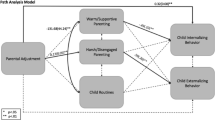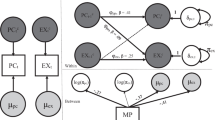Abstract
Background
Studies clearly indicate that parenting practices relate to child externalizing behaviors, although the mechanisms underlying this relation are less well understood. There has been limited evaluation of child routines and self-regulation in relation to these variables, and no known studies have evaluated all of these variables simultaneously.
Objective
This study examined child routines and self-regulation as serial mediators of the relations between positive and negative parenting practices (separately) and child externalizing problems among preschool children.
Methods
Participants included 146 maternal caregivers of preschool children who completed measures of their parenting practices and of their child’s daily routines, self-regulation, and externalizing behaviors.
Results
Results demonstrated that both child routines and self-regulation are significant mechanisms through which negative and positive parenting practices relate to externalizing problems in preschoolers, although the temporal sequencing was only upheld with respect to negative parenting. Our findings offer preliminary evidence that child routines may play a critical role in self-regulation development among preschool children, which, in turn, is inversely associated with externalizing behaviors.
Conclusion
Although further study is needed, these findings suggest that child routines and self-regulation development may be key components to incorporate clinically and evaluate empirically among intervention programs designed to prevent early development of behavior problems in preschool children.

Similar content being viewed by others
References
Barnes, J. C., Boutwell, B. B., Beaver, K. M., & Gibson, C. L. (2013). Analyzing the origins of childhood externalizing behavioral problems. Developmental Psychology, 49, 2272–2284.
Baumeister, R. F., Schmeichel, B. J., & Vohs, K. D. (2007). Self-regulation and the executive function: The self as controlling agent. In A. Kruglanski & E. T. Higgins (Eds.), Social psychology: Handbook of basic principles (2nd ed., pp. 516–539). New York: Guilford.
Bayer, J. K., Hiscock, H., Ukoumunne, O. C., Price, A., & Wake, M. (2008). Early childhood aetiology of mental health problems: a longitudinal population-based study. Journal of Child Psychology and Psychiatry, 49(11), 1166–1174.
Bronson, M. B. (2000). Self-regulation in early childhood: Nature and nurture. New York: Guilford.
Campbell, S. B., Shaw, D. S., & Gilliom, M. (2000). Early externalizing behavior problems: Toddlers and preschoolers at risk for later maladjustment. Development and Psychopathology, 12, 467–488.
Caughy, M. O., Mills, B., Owen, M. T., & Hurst, J. R. (2013). Emergent self-regulation skills among very young ethnic minority children: a confirmatory factor model. Journal of Experimental Child Psychology, 116, 839–855.
Clerkin, S. M., Marks, D. J., Policaro, K. L., & Halperin, J. M. (2007). Psychometric properties of the Alabama parenting questionnaire-preschool revision. Journal of Clinical Child and Adolescent Psychology, 36, 19–28.
Coln, K. L., Jordan, S. S., & Mercer, S. H. (2013). A unified model exploring parenting practices as mediators of marital conflict and children’s adjustment. Child Psychiatry and Human Development, 44(3), 419–429.
Darling, N., & Steinberg, L. (1993). Parenting style as context: An integrative model. Psychological Bulletin, 113, 487–496.
Eiden, R. D., Edwards, E. P., & Leonard, K. E. (2007). A conceptual model for the development of externalizing problems among kindergarten children of alcoholic families: Role of parenting and children’s self-regulation. Developmental Psychology, 43, 1187–1201.
Eisenberg, N., Spinrad, T. L., & Eggum, N. D. (2010). Emotion-related self-regulation and its relation to children’s maladjustment. Annual Review of Clinical Psychology, 6, 495–525.
Eisenberg, N., Zhou, Q., Spinrad, T., Valiente, C., Fabes, R., & Liew, J. (2005). Relations among positive parenting, children’s effortful control, and externalizing problems: A three-wave longitudinal study. Child Development, 76, 1055–1071.
Elizur, Y., Somech, L. Y., & Vinokur, A. D. (2016). Effects of parent training on callous-unemotional traits, effortful control, and conduct problems: Mediation by parenting. Journal of Abnormal Child Psychology. doi:10.1007/s10802-016-0163-7.
Eyberg, S. M., & Pincus, D. (1999). Eyberg child behavior inventory and sutter-eyberg student behavior inventory-revised: Professional manual. Psychological Assessment Resources.
Eyberg, S., & Robinson, E. (1983). Conduct problem behavior: Standardization of a behavior rating scale with adolescents. Journal of Clinical Child Psychology, 12, 347–354.
Eyberg, S. M., & Ross, A. W. (1978). Assessment of child behavior problems: The validation of a new inventory. Journal of Clinical Child & Adolescent Psychology, 7(2), 113–116.
Fiese, B. H., Tomcho, T. J., Douglas, M., Josephs, K., Poltrock, S., & Baker, T. (2002). A review of 50 years of research on naturally occurring family routines and rituals: Cause for celebration? Journal of Family Psychology, 16, 381–390.
Florez, I. R. (2011). Developing young children’s self-regulation through everyday experiences. Young Children, 66, 46–51.
George, C., & Soloman, J. (2008). The caregiving system. In J. Cassidy & P. R. Shaver (Eds.), Handbook of attachment (2nd ed., pp. 833–856). New York: Guilford Press.
Gryczkowski, M. R., Jordan, S. S., & Mercer, S. H. (2009). Differential relations between mothers’ and fathers’ parenting practices and child externalizing behavior. Journal of Child and Family Studies, 19(5), 539–546.
Haack, L. M., Villodas, M. T., McBurnett, K., Hinshaw, S., & Pfiffner, L. J. (2016). Parenting mediates symptoms and impairment in children with ADHD-Inattentive type. Journal of Clinical Child & Adolescent Psychology, 45, 155–166.
Hamre, B. K., & Pianta, R. C. (2001). Early teacher-child relationships and the trajectory of children’s school outcomes through eighth grade. Child Development, 72, 625–638.
Hardaway, C. R., Wilson, M. N., Shaw, D. S., & Dishion, T. J. (2012). Family functioning and externalizing behaviour among low-income children: self-regulation as a mediator. Infant and Child Development, 21, 67–84.
Harris, A. N., Stoppelbein, L., Greening, L., Becker, S. P., Luebbe, A., & Fite, P. (2013). Child routines and parental adjustment as correlates of internalizing and externalizing symptoms in children diagnosed with ADHD. Child Psychiatry and Human Development, 45, 243–253.
Hayes, A. F. (2013). Introduction to mediation, moderation, and conditional process analysis. New York: The Guilford Press.
Jordan, S. S. (2003). Further validation of the Child Routines Inventory (CRI): Relationship to parenting practices, maternal distress, and child externalizing behavior (Unpublished doctoral dissertation). Louisiana State University, Baton Rouge, Louisiana.
Jordan, S. S., Stary, A. K., & Barry, T. B. (2013, November). Negative parenting practices and child routines as mediators of the relation between maternal distress and child externalizing behavior: Serial and parallel models. In S. S. Jordan (Chair) (Eds.), Exploring the role of child routines and externalizing disorders across childhood: implications for prevention and intervention. A symposium at the 47th annual meeting of the Association for Behavioral and Cognitive Therapies, Nashville, TN.
Karreman, A., van Tuijl, C., van Aken, M. A. G., & Dekovic, M. (2006). Parenting and self-regulation in preschoolers: A meta-analysis. Infant and Child Development, 15, 561–579.
Koblinsky, S. A., Kuvalanka, K. A., & Randolph, S. M. (2006). Social skills and behavior problems of urban, African American preschoolers: Role of parenting practices, family conflict, and maternal depression. American Journal of Orthopsychiatry, 76, 554.
Kochanska, G., Coy, K. C., & Murray, K. T. (2001). The development of self-regulation in the first four years of life. Child Development, 72(4), 1091–1111.
Kochanska, G., & Knaack, A. (2003). Effortful control as a personality characteristic of young children: antecedents, correlates, and consequences. Journal of Personality, 71, 1087–1112.
Kochanska, G., Murray, K., & Coy, K. C. (1997). Inhibitory control as a contributor to conscience in childhood: From toddler to early school age. Child Development, 68, 263–277.
Kochanska, G., Murray, K., & Harlan, E. T. (2000). Effortful control in early childhood: Continuity and change, antecedents, and implications for social development. Developmental Psychology, 36, 220–232.
Kochanska, G., Murray, K., Jacques, T. Y., Koenig, A. L., & Vandergeest, K. A. (1996). Inhibitory control in young children and its role in emerging internalization. Child Development, 67, 490–507.
Kopp, C. B. (1982). Antecedents of self-regulation: A developmental perspective. Developmental Psychology, 18, 199–214.
Lanza, H., & Drabick, D. (2011). Family routine moderates the relation between child impulsivity and oppositional defiant disorder symptoms. Journal of Abnormal Child Psychology, 39(1), 83–94.
Martin, A., Razza, R. A., & Brooks-Gunn, J. (2012). Specifying the links between household chaos and preschool children’s development. Early Child Development and Care, 182, 1247–1263.
McClelland, M., & Cameron, C. (2012). Self-regulation in early childhood: Improving conceptual clarity and developing ecologically valid measures. Child Development Perspectives, 6, 136–142.
Owen, M. T., Caughy, M. O., Hurst, J. R., Amos, M., Hasanizadeh, N., & Mata-Otero, A. (2013). Unique contributions of fathering in emerging self-regulation in low-income ethnic minority preschoolers. Early Child Development and Care, 183, 464–482.
Patterson, G. R., DeBaryshe, B. D., & Ramsey, E. (1989). A developmental perspective on antisocial behavior. American Psychologist, 44, 329–335.
Perry, B. D. (2005). Self-regulation: The second core strength. Retrieved from: http://teacher.scholastic.com/professional/bruceperry/ self_regulation.htm.
Putnam, S. P., & Rothbart, M. K. (2006). Development of short and very short forms of the Children’s Behavior Questionnaire. Journal of Personality Assessment, 87(1), 103–113.
Razza, R. A., Bergen-Cico, D., & Raymond, K. (2013). Enhancing preschoolers’ self-regulation via mindful yoga. Journal of Child and Family Studies, 24(2), 372–385.
Rothbart, M. K., & Ahadi, S. (1994). Temperament and the development of personality. Journal of Abnormal Psychology, 103, 55–66.
Rothbart, M. K., Ahadi, S. A., Hershey, K. L., & Fisher, P. (2001). Investigations of temperament at three to seven years: The Children’s Behavior Questionnaire. Child Development, 72, 1394–1408.
Rothbart, M. K., & Bates, J. E. (2006). Temperament. In W. Damon, R. Lerner, & N. Eisenberg (Eds.), Handbook of child psychology: Social, emotional, and personality development (6th ed., Vol. 3, pp. 99–106). New York, NY: Wiley.
Shelton, K. K., Frick, P. J., & Wootton, J. (1996). Assessment of parenting practices in families of elementary school-age children. Journal of Clinical Child Psychology, 25, 317–329.
Staub, E. (1979). Positive social behavior and morality (Vol. 2). New York: Academic Press.
Stormshak, E. A., Bierman, K. L., McMahon, R. J., & Lengua, L. J. (2000). Parenting practices and child disruptive behavior problems in early elementary school. Journal of Clinical Child Psychology, 29, 17–29.
Sytsma, S. E., Kelley, M. L., & Wymer, J. H. (2001). Development and initial validation of the child routines inventory. Journal of Psychopathology and Behavioral Assessment, 23, 241–251.
Sytsma-Jordan, S., & Kelley, M. L. (2004, November). The role of child routines in relation to maternal distress and parenting practices in the prevention of child externalizing behavior problems. In A poster presented at the 38th annual meeting of the Association for the Advancement of Behavior Therapy, New Orleans, LA.
Tardif, T. W. I. L. A., Wang, L., & Olson, S. L. (2009). Culture and the development of regulatory competence: Chinese-US comparisons. Biopsychosocial Regulatory Processes in the Development of Childhood Behavioral Problems, 258–289.
Taylor, C. L. (2011), Scaffolding the development of early self-regulation: The role of structure and routine in children’s daily activities (Unpublished doctoral dissertation). Portland State University, Portland, Oregon.
Valiente, C., Eisenberg, N., Spinrad, T. L., Reiser, M., Cumberland, A., Losoya, S. H., et al. (2006). Relations among mothers’ expressivity, children’s effortful control and their problem behaviors: A four-year longitudinal study. Journal of Emotion, 6, 459–472.
von Suchodoletz, A., Trommsdorff, T., & Heikamp, T. (2011). Linking maternal warmth and responsiveness to children’s self-regulation. Social Development, 20, 486–503.
Wittig, M. M. (2005). Development and validation of the Child Routines Questionnaire: Preschool (Unpublished doctoral dissertation). Louisiana State University, Baton Rouge, Louisiana.
Author information
Authors and Affiliations
Corresponding author
Ethics declarations
Conflict of interest
The authors declare that they have no conflict of interest.
Ethical Approval
All procedures performed in studies involving human participants were in accordance with the ethical standards of the institutional and/or national research committee and with the 1964 Helsinki declaration and its later amendments or comparable ethical standards.
Human and Animal Rights
The article does not contain any studies with animals performed by any of the authors.
Informed Consent
Informed consent was obtained from all individual participants included in the study.
Rights and permissions
About this article
Cite this article
Bater, L.R., Jordan, S.S. Child Routines and Self-Regulation Serially Mediate Parenting Practices and Externalizing Problems in Preschool Children. Child Youth Care Forum 46, 243–259 (2017). https://doi.org/10.1007/s10566-016-9377-7
Published:
Issue Date:
DOI: https://doi.org/10.1007/s10566-016-9377-7




